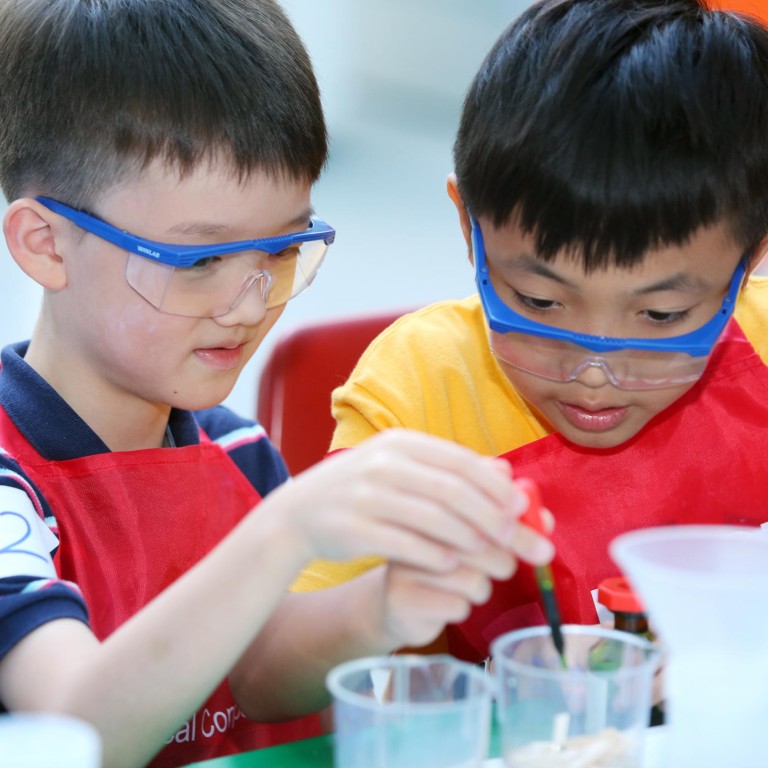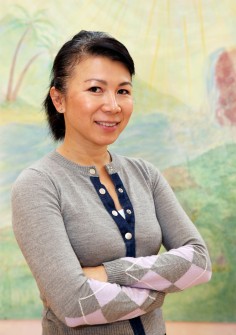
Experimentation is the best way for children to learn about science
Hands-on experimentation is the best way for children to learn about science
One of the best ways for children to learn about chemistry, biology and physics is to ignite their interest through hands-on experiments. Besides giving youngsters the chance to explore different scientific concepts through their senses, educators recognise that the experience helps develop other useful skills including problem-solving, research and perseverance.
The children also learn about co-operation as the work often requires them to discuss predictions and observations with one another.
Awesome! I thought only grown-ups were allowed to do experiments
Bill Koo, Student
At Kids Lab, an annual series of summer workshops organised by chemical giant BASF at various venues across the city, more than 600 children aged between six and 12 have been learning about the chemistry of water purification and investigating the properties of ultraviolet light - under the guidance of volunteers.
Concocting a green gunk which they then strain through a charcoal filter, young lab partners Bill Koo and Herman Chan seem to be thrilled with their results.
"Magically awesome," eight-year-old Bill says of being able to produce water that looks clean enough to drink. "I thought only grown-ups were allowed to do experiments," he adds.
Herman agrees: "This is fun because we actually do the experiments. At school, our teachers only talk about science."

Bill's mum, Joni Koo, says the workshop allowed her son to get his hands dirty and to explore, question, and investigate. "Bill loves science, but he doesn't get the chance to do many experiments at school because the teachers usually do the demonstrations," she says.
"Maybe one day he might be capable of creating his own scientific solutions, for example, health problems."
Herman's father, Bobby Chan, feels the same way. "Herman is always asking about living things, objects and materials. So being able to be a young scientist for the afternoon is tremendous fun."
Besides fuelling their scientific curiosity, the Kids Lab series aims to raise children's awareness of the environment and sustainable development. "Children learn the importance of water conservation and why it is important to protect their skin from the sun," says BASF senior specialist Diana Ng.
The Kids Lab days are designed to be fun and informative, says Anna Marie Vieiram, a senior regional manager for the company. Children are naturally curious and want to know all about their environment, so "you need to grab their attention early, because when they are 12 or 13 it may be too late," Vieiram says.
Cannie Bennett, director at of Garden House preschool in Clear Water Bay, is another educator who believes children benefit from being introduced to scientific concepts from an early age. "Learning in early childhood is characterised by experiences," she says,
The kindergarten's bread-making sessions aren't just a fun activity for the toddlers, Bennett adds. They are a way for them to see science in action through the interaction of flour, yeast, water and sugar.
In its latest report, the Trends from International Mathematics and Science Study (TIMSS) has found that science performance among Primary Four pupils from Hong Kong ranks lower than that of South Korea and Singapore. But pupils still do better than those in the US and most European countries.
An international study conducted every four years, TIMSS canvassed 3,957 Primary Four pupils from 136 primary schools, and 4,015 Secondary Two students from 117 secondary schools here.
Analysing the 2011 findings, Professor Frederick K.S. Leung of the University of Hong Kong's faculty of education, notes that Hong Kong students are less likely to have a positive attitude towards the subject, compared to students elsewhere, especially in Africa and the Middle East.
Science topics in the Hong Kong school curriculum are now integrated under the General Studies module, which relies on a combination of inquiry and textbook learning.
Some parents seeking to provide extracurricular stimulation have turned to Gateway Education, which has been running children's science programmes for over 10 years.
"Our Little Scientist courses are all about children getting their hands dirty," says Gateway owner Darren Harrison, also an experienced teacher. "The classrooms can get a bit messy, but the children love it and they keep coming back."
Qualified teachers supervise all experiments to ensure they care conducted safely.
Whether the modules involve environmental issues, flight and propulsion, air pressure or chemical reaction, they are designed to be fun so the children learn new concepts often without realising it.
"One of the great benefits of learning about science it can encourage children to explore the world they live in," Harrison says, adding that it motivates them them to embark on a lifelong voyage of discovery.
At the University of Science and Technology, biology professor Andrew Miller deals with students who have chosen a career in science. But the applications of science extend beyond the classroom, he says. "It is all around us."
Parents don't need expensive equipment to introduce young children to science; they just have to encourage them to observe what goes on in the natural world,
"Science is not the simple memorising of facts. Students need time to explore and make observations through their own experiments, and test ideas," Miller says.
